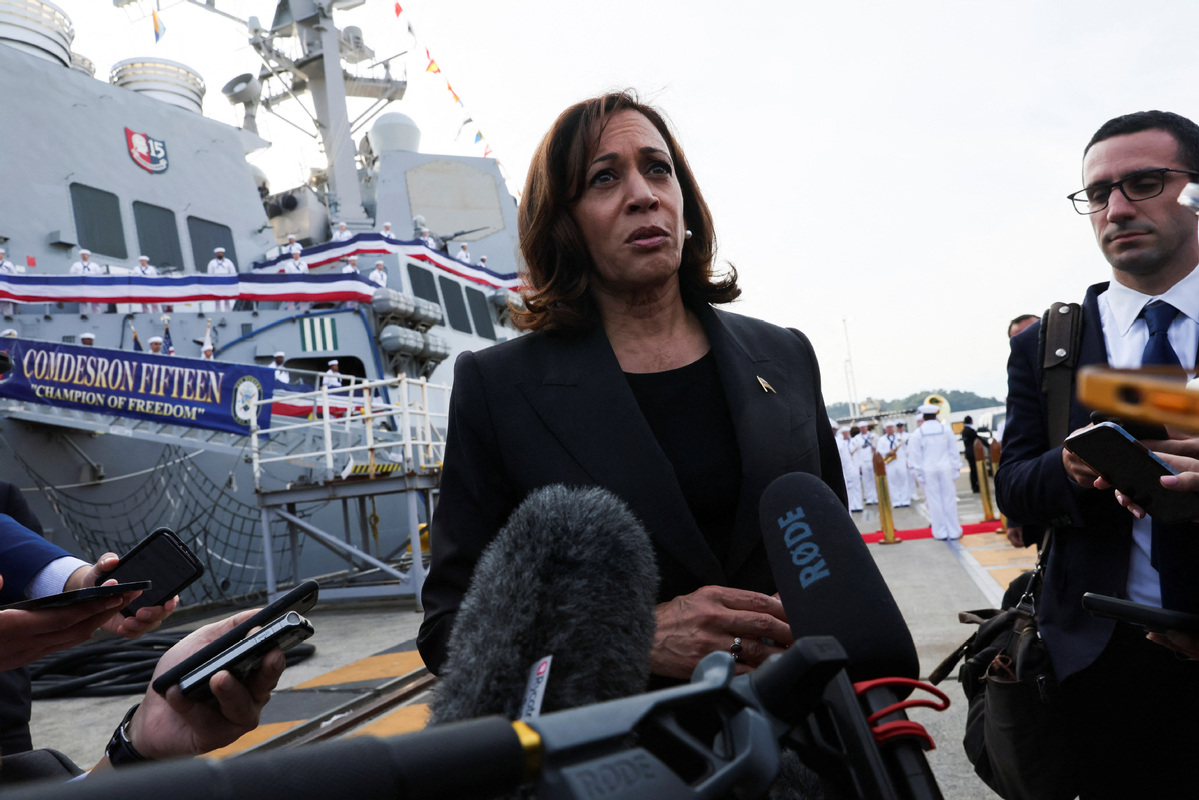US urged to stop rule-breaking behavior
By ZHAO JIA | chinadaily.com.cn | Updated: 2022-09-28 23:42

The United States should stop playing the "Taiwan card" and using Taiwan to contain China, officials and scholars said after US Vice-President Kamala Harris' visit to Japan, Washington's closest regional ally, during which she sought to further bolster support for the US stance on so-called Taiwan security issues.
During her three-day trip, which concluded on Wednesday, Harris met with Japanese Prime Minister Fumio Kishida and senior officials from the Republic of Korea and Australia.
Harris lost no opportunity to bring up the Taiwan question during her bilateral meetings with allies of the US, who were in Tokyo for the state funeral of former Japanese prime minister Shinzo Abe.
And in a speech on Wednesday to US sailors based at the largest overseas US Navy installation at Yokosuka, Japan, Harris accused China of undermining the "international rules-based order", intimidating its neighbors and engaging in proactive behavior across the Taiwan Straits.
Harris pledged that Washington would "continue to support Taiwan's self-defense" and "deepen unofficial ties" with the island.
The White House said that Harris' Asia trip, which will also take her to Seoul, was intended to underscore the US' "commitment to the Indo-Pacific region and the strength of its alliances".
It came days after US President Joe Biden said that the US military would defend Taiwan, backtracking on his promise that the US does not support "Taiwan independence".
Washington has been fudging and hollowing out the one-China principle, a political foundation of bilateral relations in the wake of the visit by US House Speaker Nancy Pelosi to the island in August. The Senate Foreign Relations Committee recently approved the "Taiwan Relations Act", which would greatly boost US military support to Taiwan.
China has on many occasions underlined that the one-China principle is what underpins peace and stability across the Taiwan Straits. The clearer and stronger the commitment of the international community is to the principle, the more likely peace across the Straits will be ensured.
"If the US cannot even keep its own word, in what position is it to talk about rules and order?" Foreign Ministry spokesman Wang Wenbin said on Wednesday at a daily news briefing.
"A country like that could only become a disrupter of international rules," Wang added.
While highlighting that the Taiwan question is at the heart of China's core interests, State Councilor and Foreign Minister Wang Yi cautioned last week that should the question, which is growing into the biggest risk affecting Sino-US ties, be mishandled, it is most likely to devastate bilateral relations.
Observers said that the moves by the US to hype up the Taiwan question to stoke tension in the region and damage relations between China and its neighbors are fraught with ideological biases and reflect Washington's typical hegemonism.
"The US plays with fire on the Taiwan question and tries to instigate security-related anxieties among its allies in order to get them to follow its steps," said Diao Daming, an associate professor of US studies at Renmin University of China.
"Such acts, sacrificing allies' interests and regional security, are extremely dangerous, reckless and selfish adventures and also irresponsible in terms of Sino-US relations, and even the peace and stability of the world at large," he added.
Diao also said that attempts by the US to form various small circles excluding China seek to maintain US hegemony and are unpopular.
The so-called "international rules-based order" is based on US standards and lacks the common consensus of the international community, said Zhang Tengjun, deputy director of the China Institute of International Studies' Department for Asia-Pacific Studies. Citing so-called rules to blame China is completely untenable, he added.
Noting that the US is the greatest threat to peace and stability across the Taiwan Straits and in the region, Zhang said cooperation between China and its neighbors is based on mutual respect and win-win results. Countries in the region have also expressed their understanding and support for China on its core interests, he added.
























